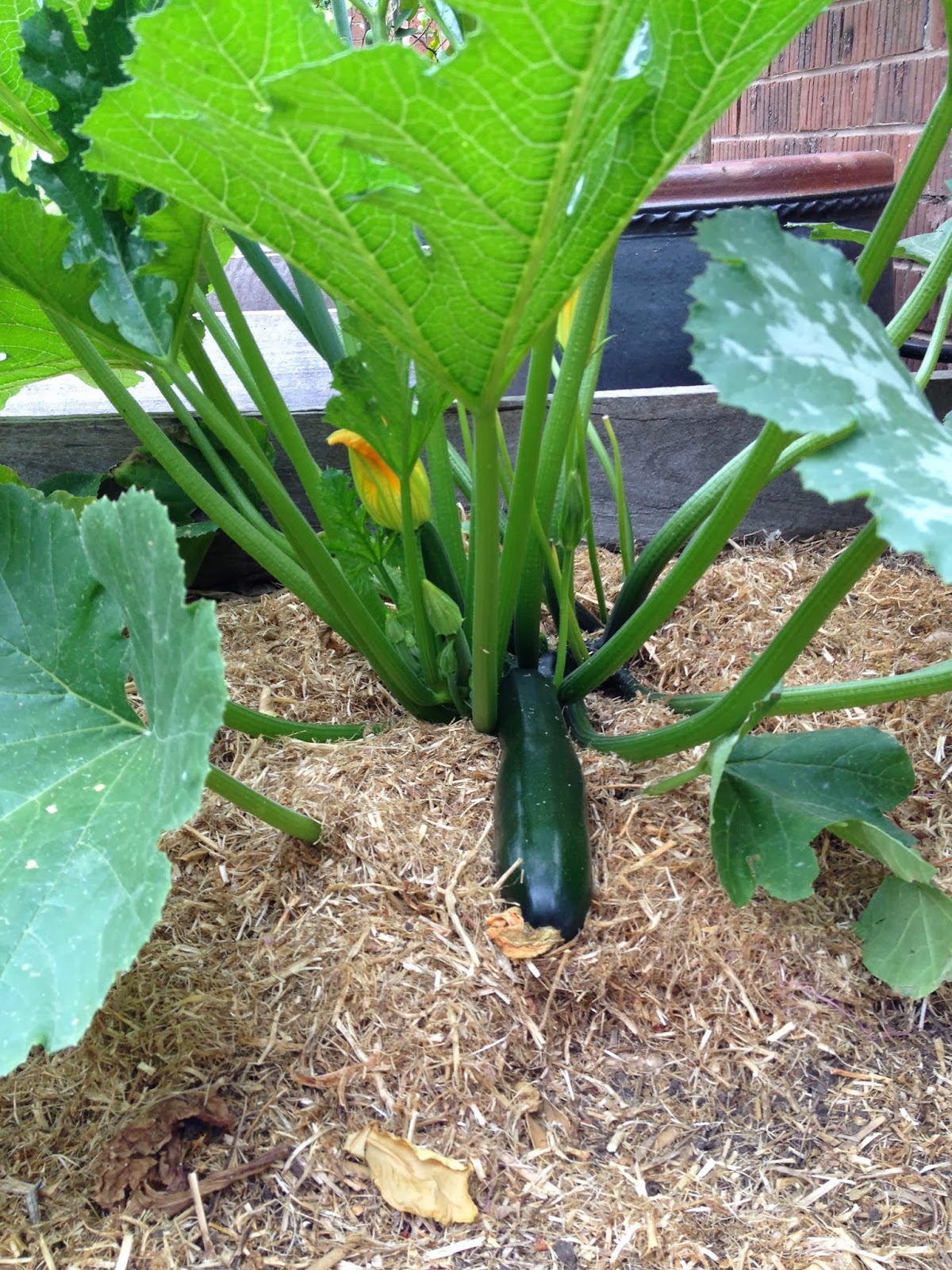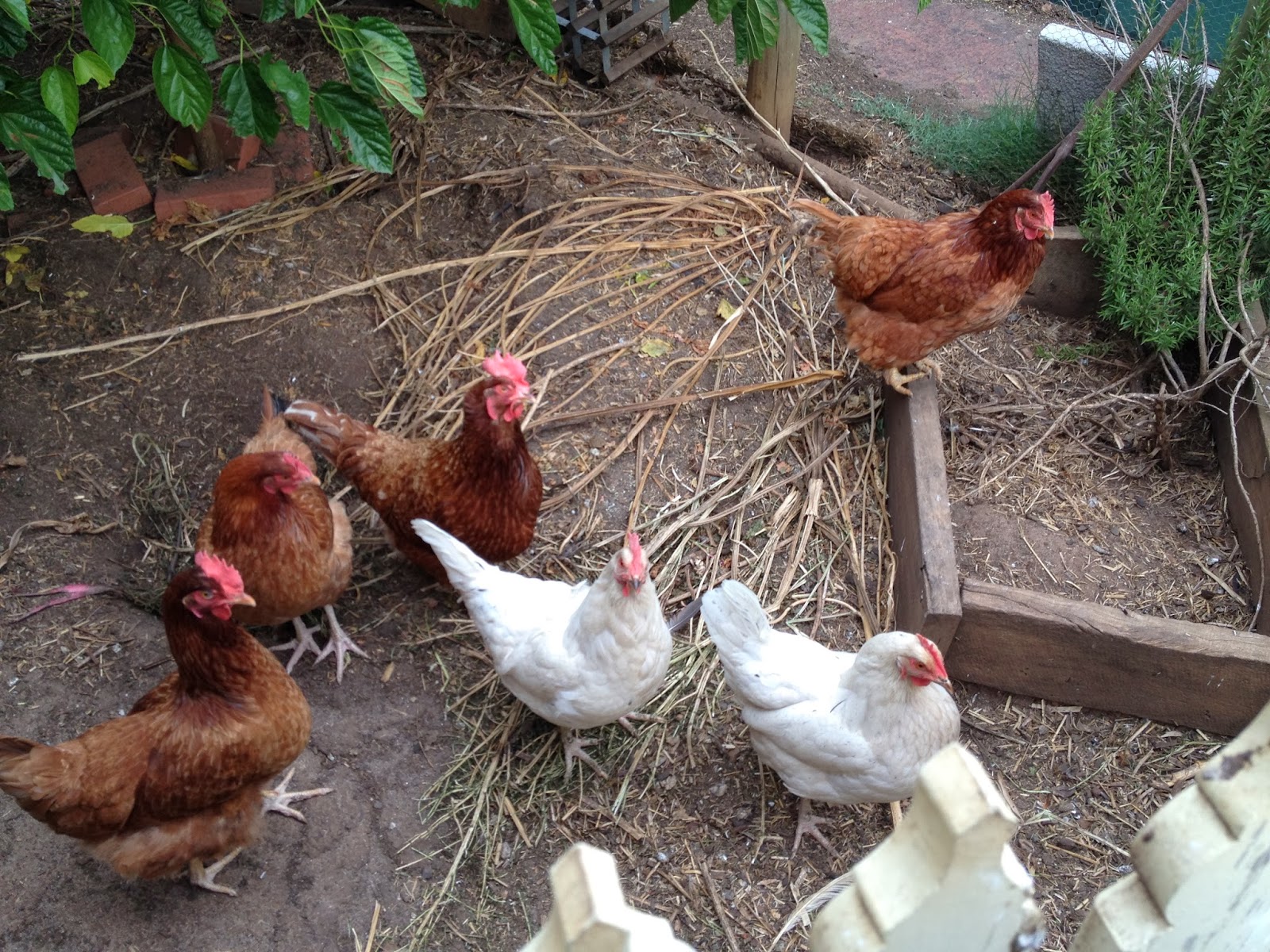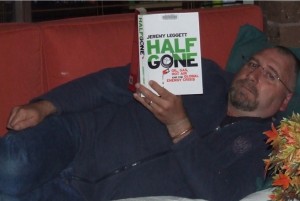
Gavin reading Half Gone back in 2007 when he had a back injury.
This post has been a while in the making, and was requested by a reader about two months ago.
I really had to think back through all the books I read in the first and subsequent years of my greening. I am a voracious reader, consuming about a book a week. That is in between greening, blog writing, podcasting, and a full-time day job.
I mostly read non-fiction books, sometimes how-to, but mainly informative books as you will read in a second. These are the books that changed my world view.
Now, this list is in no specific order except for the chronological order that I read them in. As I read each additional book, it built up my knowledge of how things work, changing my world view.
Note; Because I blog with integrity, some of the links below (the book covers) point to an affiliate program i.e. Amazon. I will receive a small commission if you decide to purchase a book via this channel. This is at no additional cost to you. Just think of it as a donation to my greening fund for all the hard work I do around here. I have to feed the chooks somehow!
Now I have that out-of-the-way, please read on…
1. Greeniology – How to live well, be green, and make a difference – Tanya Ha
This book set me on the path of greening up my lifestyle, mainly because of all of the great tips and information within it. It taught me that living a greener lifestyle was indeed possible, from a lady who knew a lot about it. I was so pleased with this book that I tracked down Tanya at the very first Sustainable Living Festival that I attended and asked her to sign it.
It proudly sits on my bookshelf above my desk. You can hear an interview I recorded with Tanya on the TGoG podcast episode 51. We even talk a little bit about the book and how it was the beginning of my effort to perform small actions to lower my environmental footprint.
Note: Tanya has updated this book with a new edition titled Greeniology 2020: Greener Living Today, And In The Future … The old version is out of print.
Blurb: Do you want to live well, be green and make a difference? There’s never been a better time to reduce your personal impact on the environment and prepare for change as our society moves towards sustainability. With topics covering everything from green cleaning and ecofashion to growing food and saving energy and water, Greeniology 2020 is a practical, fun guide to changing your lifestyle for a healthier home and healthier planet.
Award-winning environmentalist and television presenter Tanya Ha provides green living advice, tips and ideas for the beginner and committed tree-hugger alike. They will compel you to change your life, and to be part of the solution to our planet’s problems.
2. Permaculture One – Bill Mollison and David Holmgren
This book founded Permaculture. It was amazing in its simplicity. Work with nature and mimic its systems to gain a fruitful bounty with the least amount of effort.
Blurb: “Permaculture One presents unique strategies for creating a food-producing system specifically suited to your needs, whether you garden in your backyard or engage in full-scale farming. By carefully designing a system around functional relationships between plant and animal species you can create a stable ‘cultivated ecology’ suited to local conditions.
The book provides a catalog of 130 trees and plants useful to a permaculture system. The authors have based permaculture on the underlying philosophy ‘of working with, rather than against nature’ of protracted and thoughtful observation rather than protracted and thoughtless labor; and of looking at plants and animals in all their functions rather than treating any area as a single product system.Focusing throughout the book on providing for human needs while maintaining a deep respect for the finite resources of the earth. Mollison and Holmgren propose an alternative to the resource-hungry methods of commercial agriculture. ‘Permaculture One’ gives you the tools to begin at your own doorstep.“
3. The Organic Gardener – An easy guide to growing healthy fruit, vegetables and plants in the Australian garden – Jeffrey Hodges
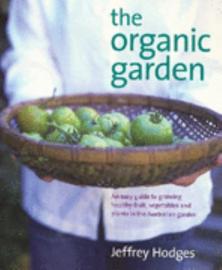 This was my first real gardening book. From it I learnt how to build soil, how to rotate crops in a small garden, and what to plant when. I also learnt a bit about no-dig gardening and how to layer a raised garden bed.
This was my first real gardening book. From it I learnt how to build soil, how to rotate crops in a small garden, and what to plant when. I also learnt a bit about no-dig gardening and how to layer a raised garden bed.
Blurb: Jeffrey Hodges’ time-saving, minimal-energy techniques have been turning ordinary gardeners into organic green-thumbs for years. With his winning ideas even the busiest, least motivated gardener can attain a bountiful garden that works in harmony with nature, rather than against it. Try them now, and produce your own healthy, chemical-free fruits, vegetables and flowers. This beautifully illustrated manual explains how to:
- turn your garden into a self-sufficient source of vegetables, fruit and flowers
- design a garden ecosystem that includes bird-attracting native shrubs and trees
- start a garden of any size using the ‘no-dig’ and other amazingly easy methods
- use techniques such as composting, mulching, crop rotation, companion planting and ‘self-recycling’ gardening to maximise pleasure and results and minimise time and effort
- grow great gardens without artificial fertilisers or chemical pesticides
- look after your pot plants and balcony garden
- become attuned to the natural world and help sustain the environment in lots of practical ways.
4. Half Gone – Oil, Gas, Hot air and the global energy crisis – Jeremy Leggett.
Everything you need to know about the coming energy descent, but were afraid to ask. This book tells it like it is, and I found out the truth about peak oil and the industry smoke screen that surrounds it.
Blurb: Here is the book that exposes the true status of the world’s energy supplies, revealing both the scale of the disaster looming over our planet, and the action each and every one of us must take right now to stand a chance of averting it. No previous book on the oil trade has had such unprecedented access to the boardrooms of the mightiest oil companies, or such insider knowledge of geology and engineering. And none has made such a persuasive and inspiring call for immediate individual action.
5. The End of Food – The coming crisis in the world food industry – Paul Roberts
I really didn’t know much about the food industry until I read this book. With this book under my belt I was ready to watch the documentary Food Inc. and understand it a lot deeper than one would if going in cold.
Blurb; Salmonella-tainted tomatoes, riots, and skyrocketing prices are only the latest in a series of food-related crises that have illuminated the failures of the modern food system. In The End of Food, Paul Roberts investigates this system and presents a startling truth—how we make, market, and transport our food is no longer compatible with the billions of consumers the system was built to serve.
The emergence of large-scale and efficient food production forever changed our relationship with food and ultimately left a vulnerable and paradoxical system in place. High-volume factory systems create new risks for food-borne illness; high-yield crops generate grain, produce, and meat of declining nutritional quality; and while nearly a billion people are overweight, roughly as many people are starving.
In this vivid narrative, Roberts presents clear, stark visions of the future and helps us prepare to make the necessary decisions to survive the demise of food production as we know it.
6. Heat – How we can stop the planet burning – George Monbiot
Finally. A book that offered some big thinking solutions to climate change. It was a very interesting read, and showed me that individual actions are just as important as whole country legislated policies.
Blurb; Started to worry about just how hot our world is going to get, and whether you can do anything about it? As the effect of climate change grows by the day, so does the amount of hot air and bluster spouted by politicians and businessmen on what we should do about it. What with the excuses, the lies, the fudged figures, the PR greenwashing and the downright misinformation on the power of everything from wind turbines to carbon trading, when it comes to saving the world, most people don’t know what they’re talking about.
Luckily, George Monbiot – scourge of big business, riler of governments, arch-enemy of climate change deniers everywhere – does. Packed with killer facts and inspiring ideas, shot through with passion and underlined by brilliant investigative journalism, with a copy of “Heat” you really can protect the planet. ‘I defy you to read this book and not feel motivated
7. Peak Everything – Waking up to the century of decline – Richard Heinberg
So I managed to get the concepts of climate change and peak oil under wraps, but what about everything else? Peak population. Peak resources. Peak Food. Peak Fresh Water. Peak Pollution (aka climate change). Well this book had it all. Written as short essays and cleverly woven together, this book changed the way I looked at resource depletion and energy descent. Scary stuff, but a must read.
Blurb; The twentieth century saw unprecedented growth in population, energy consumption, and food production. As the population shifted from rural to urban, human impacts on the environment increased dramatically. The twenty-first century ushered in an era of declines, including:
- Oil, natural gas, and coal extraction
- Yearly grain harvests
- Climate stability
- Economic growth
- Fresh water
- Minerals and ores such as copper and platinum
To adapt to this profoundly different world, we must begin now to make radical changes to our attitudes, behaviors, and expectations. Now in paperback and featuring a new author preface and discussion guide, Peak Everything addresses many of the cultural, psychological, and practical changes we will have to make as nature dictates our new limits. This landmark book from Richard Heinberg, author of three of the most important books on Peak Oil, touches on the vital aspects of the human condition at this unique moment in time.
A combination of wry commentary and sober forecasting on subjects as diverse as farming and industrial design, this book describes how to make the transition from The Age of Excess to the Era of Modesty with grace and satisfaction, while preserving the best of our collective achievements. Peak Everything is a must-read for individuals, business leaders, and policy makers serious about effecting real change.
8. Downshift to the Good life – 52 brilliant ideas to scale it down and live it up – Lynn Huggins-Cooper
This book made me consider the idea of downshifting in my own life. It planted the seed for when the inevitable happened and I needed to take stock of my own life. It was broken down into small, easy to digest pieces. The author gives the tools for everyone to at least consider what a down-shifted life might look like and how it might be better than the frantic rat-race most of us run. A very good read.
Blurb; Is city life getting to you? Do you wake up on Monday mornings and dread the commute? Fed up with office politics and the stress and strain of your working week? Do you dream of a life change? Well, here are 52 brilliant ideas for de-stressing your world and living the good life. And they’ve been truly road-tested. A few years ago I could answer ‘yes’ to all the questions above. Now I live in the country in a beautiful house and have a lifestyle I could only dream of previously. If you follow my advice, you can, too.” Lynn Huggins-Cooper
What it’s about
Downshift to the good life is for anyone who dreams of a more peaceful and relaxing lifestyle and who wants to leap off the treadmill. It’s packed full of inspirational ideas to help readers assess where they are, where they want to be and how to get there. So whether you are after a country idyll yor just want to work less and play more this book will prove invaluable in helping you achieve your dreams. Lynn Huggins-Cooper reveals how to:
- Stop in your tracks and evaluate where you are, what you have done, what is really important to you and what the future holds
- Get off the consumer carousel (time to ditch the mortgage? credit cards?)
- Live with a reduced salary and reduce your outgoings
- Downshift at work and/or take on a lower-level job
- Become a flexi–worker or freelancer. What are your skills, and are they marketable?
- Live by the seasons – appreciate the delights that come with each month
With the 52 Brilliant Ideas series readers can enhance their existing skills with negligible investment of time or money and will substantially improve their performance over the course of a year. Each of the 52 chapters tackles a single aspect of the subject in an entertaining and lively way. At the end of each chapter is a “how did it go?” feature which allows readers to reflect on the lesson in a classical experiential learning pattern. The tone of each book is personal and informal; readers will feel as thought they are having a one-to-one with their favourite coach.
9. The Seed Savers’ Handbook – Michel and Jude Fanton
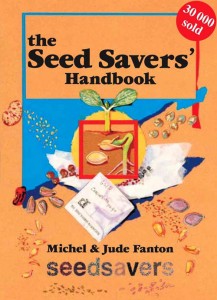 I had been gardening for about a year and often wondered if I could keep the seeds that some of my plant produced at the end of their lives. It was a shame to waste this valuable resource, a gift from nature. But how do you collect and store the seeds.
I had been gardening for about a year and often wondered if I could keep the seeds that some of my plant produced at the end of their lives. It was a shame to waste this valuable resource, a gift from nature. But how do you collect and store the seeds.
This book answered all my questions, and expanded my gardening knowledge dramatically. I now save most of my own seed because of the information imparted by this book. A very valuable resource to have in your home library.
Blurb; The Seed Savers’ Handbook is a complete reference for growing, preparing and conserving 117 traditional varieties of food plants. Written especially for Australian and New Zealand conditions in 1993 by Michel and Jude Fanton, founders of The Seed Savers’ Network. 30,000 of the original edition sold with another 30,000 copies of translations and adaptations sold around the world.
10. The Great Disruption – How the climate crisis will transform the global economy – Paul Gilding
This book was a real eye opener. I was looking for solutions and this book gave me some. Beyond climate change. Beyond Peak Everything. The Author talks about the end of economic growth. Not that far-fetched, and knowing what I know, it is easy to believe that Gilding predicts that The Great Disruption will happen sometime around the year 2018. I gave a full review here. I just hope we see the solutions in time.
Blurb; It’s time to stop just worrying about climate change, says Paul Gilding. We need instead to brace for impact because global crisis is no longer avoidable. This Great Disruption started in 2008, with spiking food and oil prices and dramatic ecological changes, such as the melting ice caps. It is not simply about fossil fuels and carbon footprints. We have come to the end of Economic Growth, Version 1.0, a world economy based on consumption and waste, where we lived beyond the means of our planet’s ecosystems and resources.
The Great Disruption offers a stark and unflinching look at the challenge humanity faces-yet also a deeply optimistic message. The coming decades will see loss, suffering, and conflict as our planetary overdraft is paid; however, they will also bring out the best humanity can offer: compassion, innovation, resilience, and adaptability.
Gilding tells us how to fight-and win-what he calls The One Degree War to prevent catastrophic warming of the earth, and how to start today. The crisis represents a rare chance to replace our addiction to growth with an ethic of sustainability, and it’s already happening. It’s also an unmatched business opportunity: Old industries will collapse while new companies will literally reshape our economy.
In the aftermath of the Great Disruption, we will measure “growth” in a new way. It will mean not quantity of stuff but quality and happiness of life. Yes, there is life after shopping.
11. Living the Good Life – How One Family Changed Their World From Their Own Backyard – Linda Cockburn
I was only going to list ten books, but upon reflection, I just had to list this classic. It was brilliant. This book made me laugh and it made me cry. Linda is a fantastic storyteller, and their quest to live for a year without spending any money inspired me to cut back and try to live more frugally, and certainly within our means here on our suburban block.
Linda has since moved from Queensland where the book was written, to Tasmania. There with Trev and Caleb, she is building (nearly built) a straw bale home on a plot of land. You can still follow her adventures on her blog, Living the Good Life.
Blurb; Inspiring and challenging, this chronicle of a unique household experiment takes readers inside one family’s environmental test. Already mindful of the impact human activity has on the environment, the author and her family decided to take a further step towards thoughtful living by aiming for complete domestic sustainability.
For six months, the Cockburns grew, bartered for, and made everything they ate; used exclusively solar power; collected rainwater for drinking, cleaning, and cooking; parked the cars and turned to bicycles; and aimed to not spend a single dollar. From just their average home on an average-sized lot, they experienced success, surprises, and challenges in their quest—all while learning about themselves as a family. Whether readers are looking for lessons on adopting some—or all—of the Cockburns’ practices or are just curious about what it might take to “do it yourself” even more deeply, this story will bring them along for the ride.
Summary
There are probably many more I could stack on top of this list, but when I read these eleven books, I remember having an emotional response, similar to the light bulb moments I had whilst watching the Eco Documentaries That Changed My World View.
I could probably list another eleven books that gave me a bit of information here and there, but it was these books that made the biggest impact.
It would also be amiss of me not to mention my own books. All of the books that I have listed, and many others, inspired me to write my own books about sustainable living. You can peruse them at my eBookstore.
Now here is where you come in, my green readers. I want you to chime in with at least one book that changed your world view. It doesn’t particularly have to be a green or sustainable living book, but if that is what rocked your world, then comment away.
I would love to hear about those volumes that make you look at the world a little (or a lot) differently.
Over to you!













